LAW10001 Contract Law I: Molly, Pam, and Pete's Legal Dispute
VerifiedAdded on 2022/12/20
|7
|1812
|1
Case Study
AI Summary
This assignment provides a comprehensive analysis of a contract law problem involving Molly, Pam, and Pete. The student analyzes the situation where Molly threatens to evict Pam and Pete from her house, where they were invited to stay in exchange for monetary consideration. The analysis covers the essential elements of a valid contract, including offer, acceptance, consideration, and intention to create a binding legal agreement. The student applies these principles to the facts, examining whether a legally binding contract existed between the parties, and the implications of an oral agreement. The assignment evaluates the arguments for and against the existence of a contract, considering the exchange of value, the intention of the parties, and the certainty of the agreement. The conclusion offers legal advice to Pam and Pete, based on the analysis of the contract law principles.
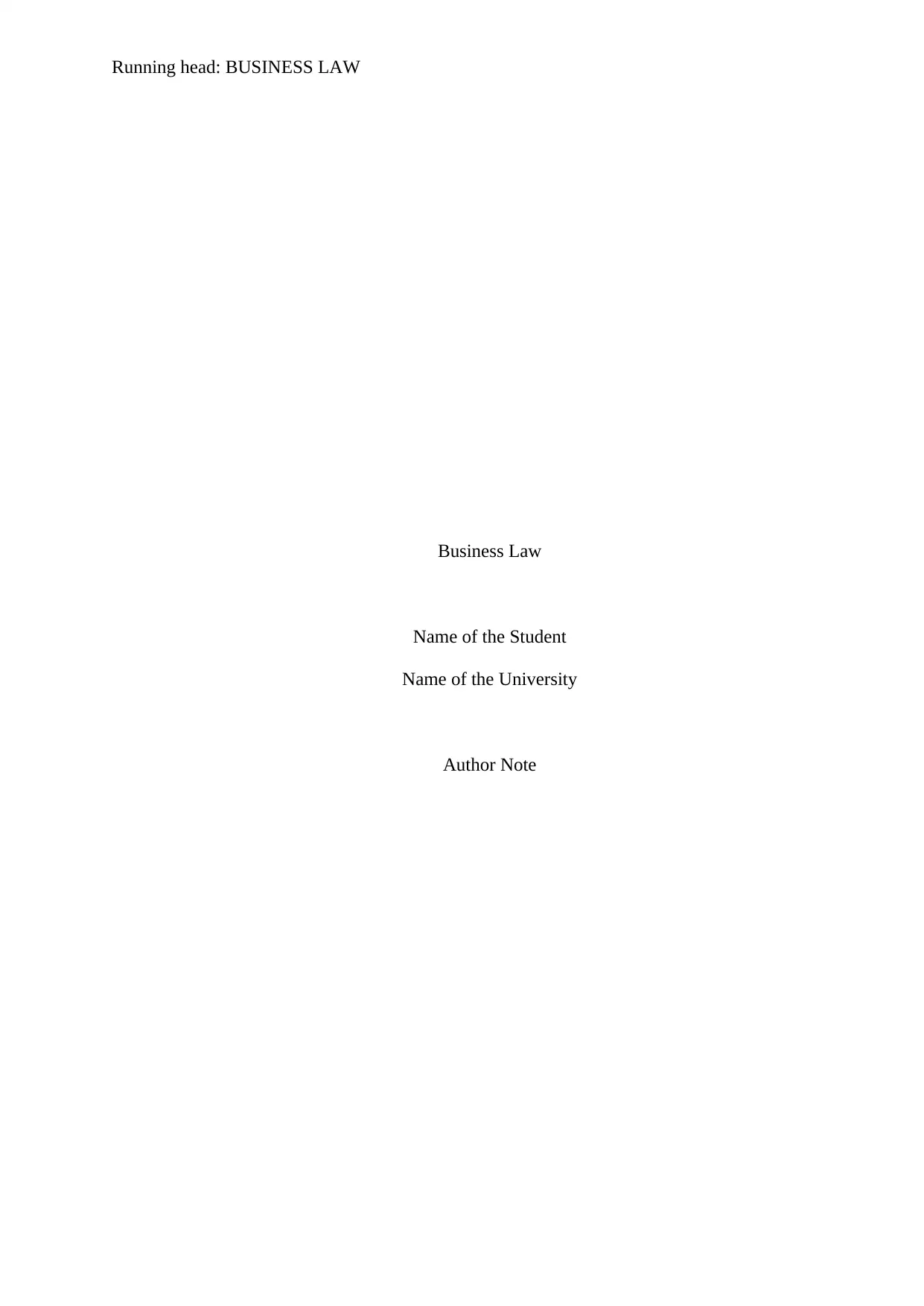
Running head: BUSINESS LAW
Business Law
Name of the Student
Name of the University
Author Note
Business Law
Name of the Student
Name of the University
Author Note
Paraphrase This Document
Need a fresh take? Get an instant paraphrase of this document with our AI Paraphraser
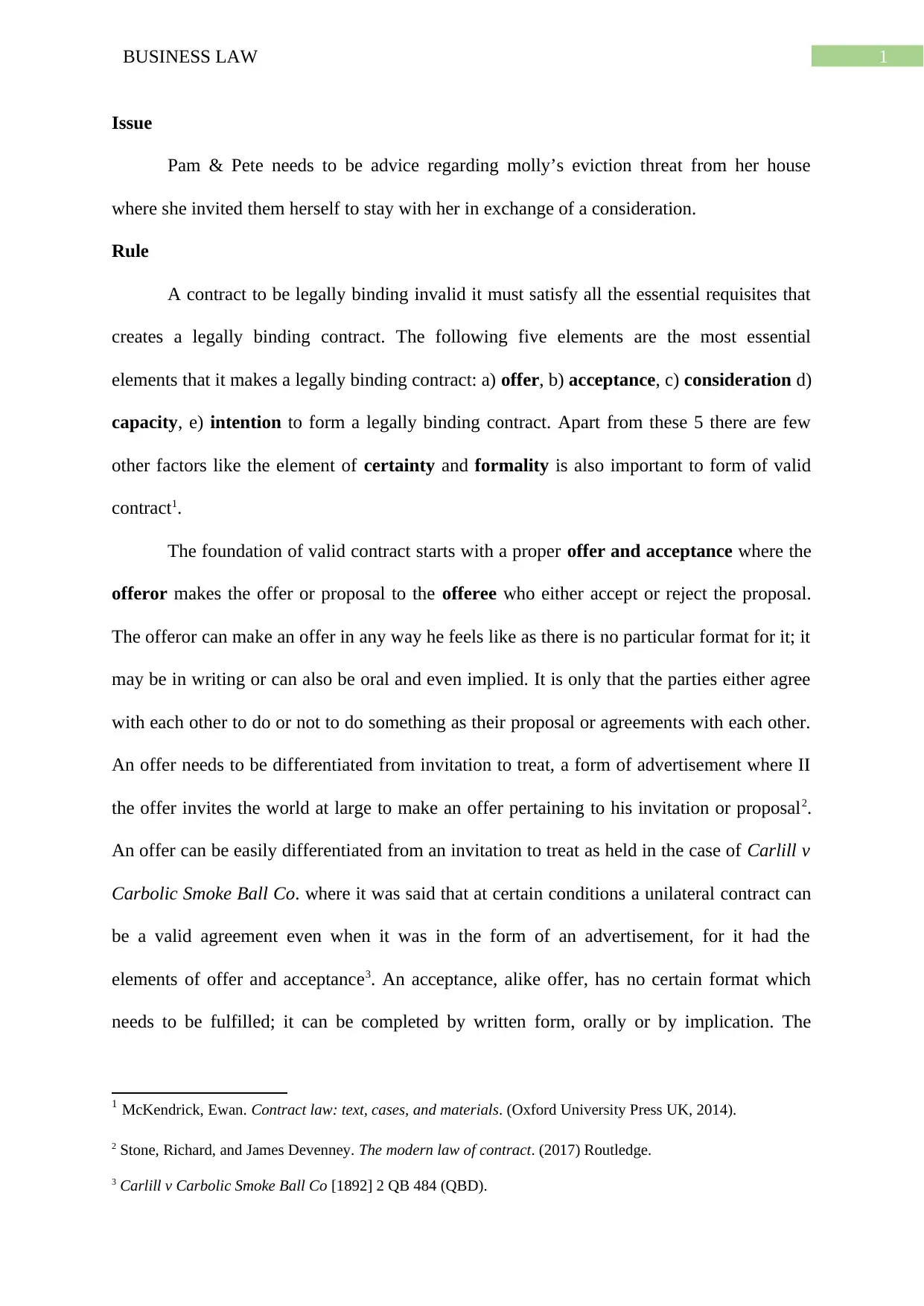
1BUSINESS LAW
Issue
Pam & Pete needs to be advice regarding molly’s eviction threat from her house
where she invited them herself to stay with her in exchange of a consideration.
Rule
A contract to be legally binding invalid it must satisfy all the essential requisites that
creates a legally binding contract. The following five elements are the most essential
elements that it makes a legally binding contract: a) offer, b) acceptance, c) consideration d)
capacity, e) intention to form a legally binding contract. Apart from these 5 there are few
other factors like the element of certainty and formality is also important to form of valid
contract1.
The foundation of valid contract starts with a proper offer and acceptance where the
offeror makes the offer or proposal to the offeree who either accept or reject the proposal.
The offeror can make an offer in any way he feels like as there is no particular format for it; it
may be in writing or can also be oral and even implied. It is only that the parties either agree
with each other to do or not to do something as their proposal or agreements with each other.
An offer needs to be differentiated from invitation to treat, a form of advertisement where II
the offer invites the world at large to make an offer pertaining to his invitation or proposal2.
An offer can be easily differentiated from an invitation to treat as held in the case of Carlill v
Carbolic Smoke Ball Co. where it was said that at certain conditions a unilateral contract can
be a valid agreement even when it was in the form of an advertisement, for it had the
elements of offer and acceptance3. An acceptance, alike offer, has no certain format which
needs to be fulfilled; it can be completed by written form, orally or by implication. The
1 McKendrick, Ewan. Contract law: text, cases, and materials. (Oxford University Press UK, 2014).
2 Stone, Richard, and James Devenney. The modern law of contract. (2017) Routledge.
3 Carlill v Carbolic Smoke Ball Co [1892] 2 QB 484 (QBD).
Issue
Pam & Pete needs to be advice regarding molly’s eviction threat from her house
where she invited them herself to stay with her in exchange of a consideration.
Rule
A contract to be legally binding invalid it must satisfy all the essential requisites that
creates a legally binding contract. The following five elements are the most essential
elements that it makes a legally binding contract: a) offer, b) acceptance, c) consideration d)
capacity, e) intention to form a legally binding contract. Apart from these 5 there are few
other factors like the element of certainty and formality is also important to form of valid
contract1.
The foundation of valid contract starts with a proper offer and acceptance where the
offeror makes the offer or proposal to the offeree who either accept or reject the proposal.
The offeror can make an offer in any way he feels like as there is no particular format for it; it
may be in writing or can also be oral and even implied. It is only that the parties either agree
with each other to do or not to do something as their proposal or agreements with each other.
An offer needs to be differentiated from invitation to treat, a form of advertisement where II
the offer invites the world at large to make an offer pertaining to his invitation or proposal2.
An offer can be easily differentiated from an invitation to treat as held in the case of Carlill v
Carbolic Smoke Ball Co. where it was said that at certain conditions a unilateral contract can
be a valid agreement even when it was in the form of an advertisement, for it had the
elements of offer and acceptance3. An acceptance, alike offer, has no certain format which
needs to be fulfilled; it can be completed by written form, orally or by implication. The
1 McKendrick, Ewan. Contract law: text, cases, and materials. (Oxford University Press UK, 2014).
2 Stone, Richard, and James Devenney. The modern law of contract. (2017) Routledge.
3 Carlill v Carbolic Smoke Ball Co [1892] 2 QB 484 (QBD).
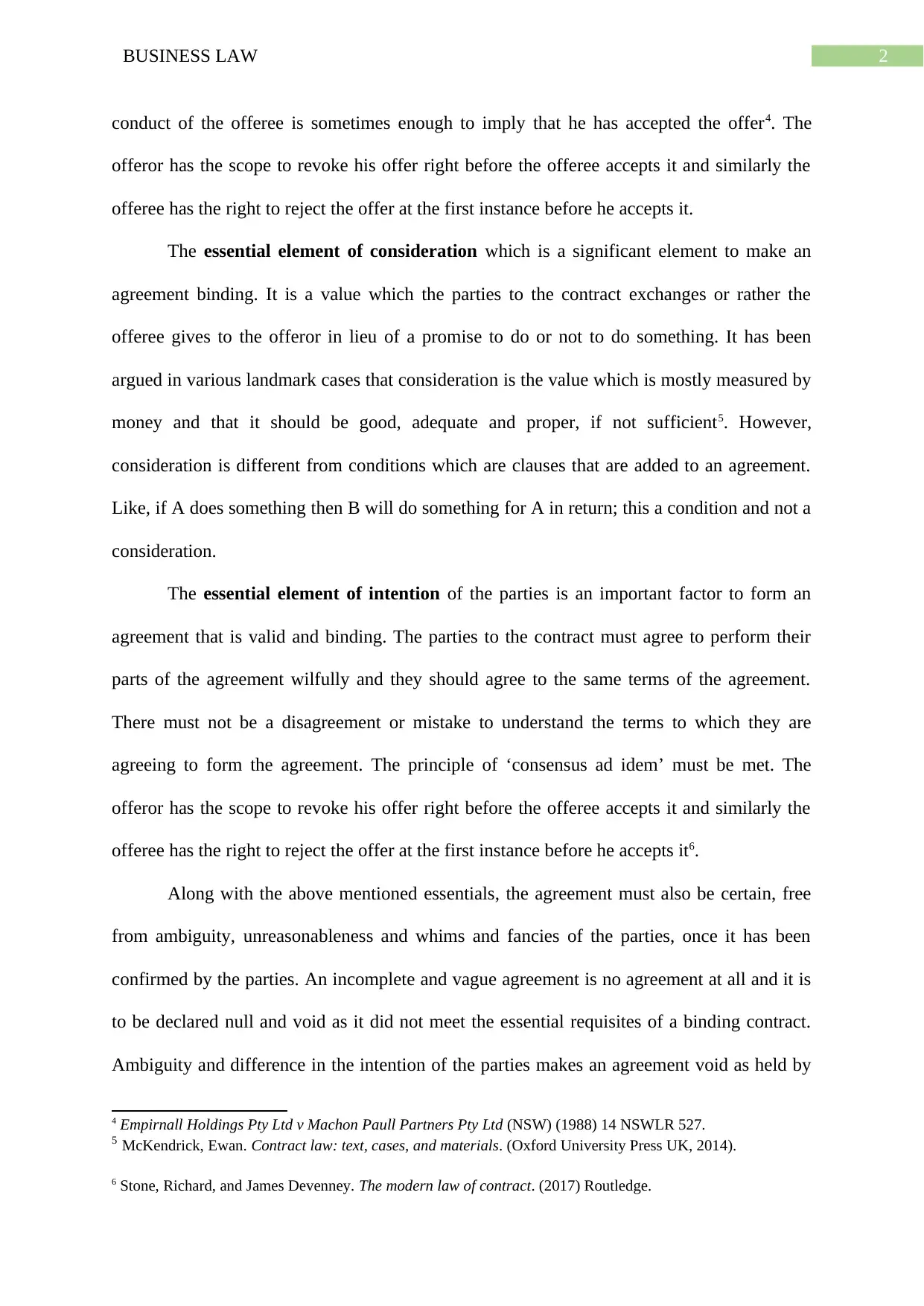
2BUSINESS LAW
conduct of the offeree is sometimes enough to imply that he has accepted the offer4. The
offeror has the scope to revoke his offer right before the offeree accepts it and similarly the
offeree has the right to reject the offer at the first instance before he accepts it.
The essential element of consideration which is a significant element to make an
agreement binding. It is a value which the parties to the contract exchanges or rather the
offeree gives to the offeror in lieu of a promise to do or not to do something. It has been
argued in various landmark cases that consideration is the value which is mostly measured by
money and that it should be good, adequate and proper, if not sufficient5. However,
consideration is different from conditions which are clauses that are added to an agreement.
Like, if A does something then B will do something for A in return; this a condition and not a
consideration.
The essential element of intention of the parties is an important factor to form an
agreement that is valid and binding. The parties to the contract must agree to perform their
parts of the agreement wilfully and they should agree to the same terms of the agreement.
There must not be a disagreement or mistake to understand the terms to which they are
agreeing to form the agreement. The principle of ‘consensus ad idem’ must be met. The
offeror has the scope to revoke his offer right before the offeree accepts it and similarly the
offeree has the right to reject the offer at the first instance before he accepts it6.
Along with the above mentioned essentials, the agreement must also be certain, free
from ambiguity, unreasonableness and whims and fancies of the parties, once it has been
confirmed by the parties. An incomplete and vague agreement is no agreement at all and it is
to be declared null and void as it did not meet the essential requisites of a binding contract.
Ambiguity and difference in the intention of the parties makes an agreement void as held by
4 Empirnall Holdings Pty Ltd v Machon Paull Partners Pty Ltd (NSW) (1988) 14 NSWLR 527.
5 McKendrick, Ewan. Contract law: text, cases, and materials. (Oxford University Press UK, 2014).
6 Stone, Richard, and James Devenney. The modern law of contract. (2017) Routledge.
conduct of the offeree is sometimes enough to imply that he has accepted the offer4. The
offeror has the scope to revoke his offer right before the offeree accepts it and similarly the
offeree has the right to reject the offer at the first instance before he accepts it.
The essential element of consideration which is a significant element to make an
agreement binding. It is a value which the parties to the contract exchanges or rather the
offeree gives to the offeror in lieu of a promise to do or not to do something. It has been
argued in various landmark cases that consideration is the value which is mostly measured by
money and that it should be good, adequate and proper, if not sufficient5. However,
consideration is different from conditions which are clauses that are added to an agreement.
Like, if A does something then B will do something for A in return; this a condition and not a
consideration.
The essential element of intention of the parties is an important factor to form an
agreement that is valid and binding. The parties to the contract must agree to perform their
parts of the agreement wilfully and they should agree to the same terms of the agreement.
There must not be a disagreement or mistake to understand the terms to which they are
agreeing to form the agreement. The principle of ‘consensus ad idem’ must be met. The
offeror has the scope to revoke his offer right before the offeree accepts it and similarly the
offeree has the right to reject the offer at the first instance before he accepts it6.
Along with the above mentioned essentials, the agreement must also be certain, free
from ambiguity, unreasonableness and whims and fancies of the parties, once it has been
confirmed by the parties. An incomplete and vague agreement is no agreement at all and it is
to be declared null and void as it did not meet the essential requisites of a binding contract.
Ambiguity and difference in the intention of the parties makes an agreement void as held by
4 Empirnall Holdings Pty Ltd v Machon Paull Partners Pty Ltd (NSW) (1988) 14 NSWLR 527.
5 McKendrick, Ewan. Contract law: text, cases, and materials. (Oxford University Press UK, 2014).
6 Stone, Richard, and James Devenney. The modern law of contract. (2017) Routledge.
⊘ This is a preview!⊘
Do you want full access?
Subscribe today to unlock all pages.

Trusted by 1+ million students worldwide
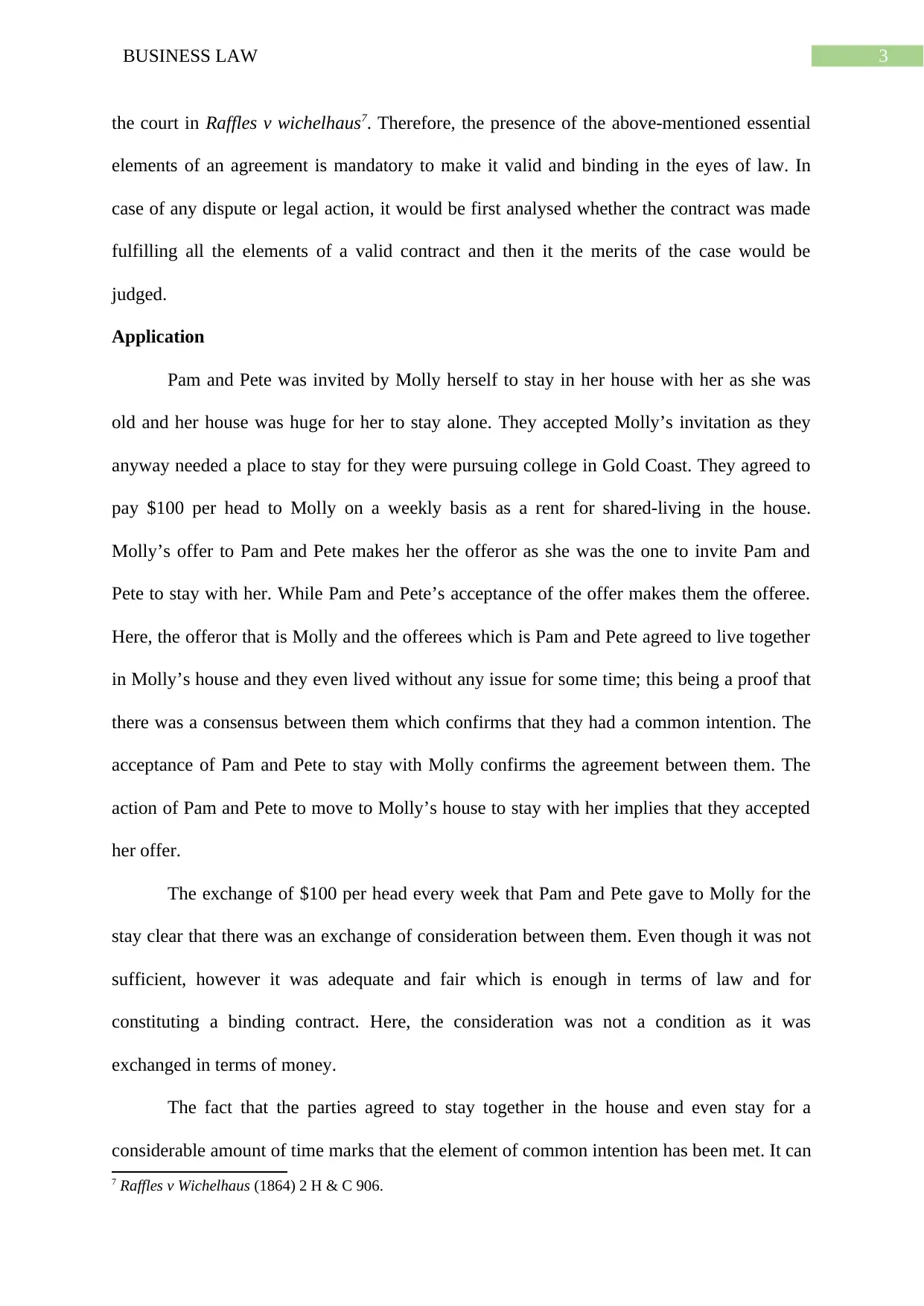
3BUSINESS LAW
the court in Raffles v wichelhaus7. Therefore, the presence of the above-mentioned essential
elements of an agreement is mandatory to make it valid and binding in the eyes of law. In
case of any dispute or legal action, it would be first analysed whether the contract was made
fulfilling all the elements of a valid contract and then it the merits of the case would be
judged.
Application
Pam and Pete was invited by Molly herself to stay in her house with her as she was
old and her house was huge for her to stay alone. They accepted Molly’s invitation as they
anyway needed a place to stay for they were pursuing college in Gold Coast. They agreed to
pay $100 per head to Molly on a weekly basis as a rent for shared-living in the house.
Molly’s offer to Pam and Pete makes her the offeror as she was the one to invite Pam and
Pete to stay with her. While Pam and Pete’s acceptance of the offer makes them the offeree.
Here, the offeror that is Molly and the offerees which is Pam and Pete agreed to live together
in Molly’s house and they even lived without any issue for some time; this being a proof that
there was a consensus between them which confirms that they had a common intention. The
acceptance of Pam and Pete to stay with Molly confirms the agreement between them. The
action of Pam and Pete to move to Molly’s house to stay with her implies that they accepted
her offer.
The exchange of $100 per head every week that Pam and Pete gave to Molly for the
stay clear that there was an exchange of consideration between them. Even though it was not
sufficient, however it was adequate and fair which is enough in terms of law and for
constituting a binding contract. Here, the consideration was not a condition as it was
exchanged in terms of money.
The fact that the parties agreed to stay together in the house and even stay for a
considerable amount of time marks that the element of common intention has been met. It can
7 Raffles v Wichelhaus (1864) 2 H & C 906.
the court in Raffles v wichelhaus7. Therefore, the presence of the above-mentioned essential
elements of an agreement is mandatory to make it valid and binding in the eyes of law. In
case of any dispute or legal action, it would be first analysed whether the contract was made
fulfilling all the elements of a valid contract and then it the merits of the case would be
judged.
Application
Pam and Pete was invited by Molly herself to stay in her house with her as she was
old and her house was huge for her to stay alone. They accepted Molly’s invitation as they
anyway needed a place to stay for they were pursuing college in Gold Coast. They agreed to
pay $100 per head to Molly on a weekly basis as a rent for shared-living in the house.
Molly’s offer to Pam and Pete makes her the offeror as she was the one to invite Pam and
Pete to stay with her. While Pam and Pete’s acceptance of the offer makes them the offeree.
Here, the offeror that is Molly and the offerees which is Pam and Pete agreed to live together
in Molly’s house and they even lived without any issue for some time; this being a proof that
there was a consensus between them which confirms that they had a common intention. The
acceptance of Pam and Pete to stay with Molly confirms the agreement between them. The
action of Pam and Pete to move to Molly’s house to stay with her implies that they accepted
her offer.
The exchange of $100 per head every week that Pam and Pete gave to Molly for the
stay clear that there was an exchange of consideration between them. Even though it was not
sufficient, however it was adequate and fair which is enough in terms of law and for
constituting a binding contract. Here, the consideration was not a condition as it was
exchanged in terms of money.
The fact that the parties agreed to stay together in the house and even stay for a
considerable amount of time marks that the element of common intention has been met. It can
7 Raffles v Wichelhaus (1864) 2 H & C 906.
Paraphrase This Document
Need a fresh take? Get an instant paraphrase of this document with our AI Paraphraser
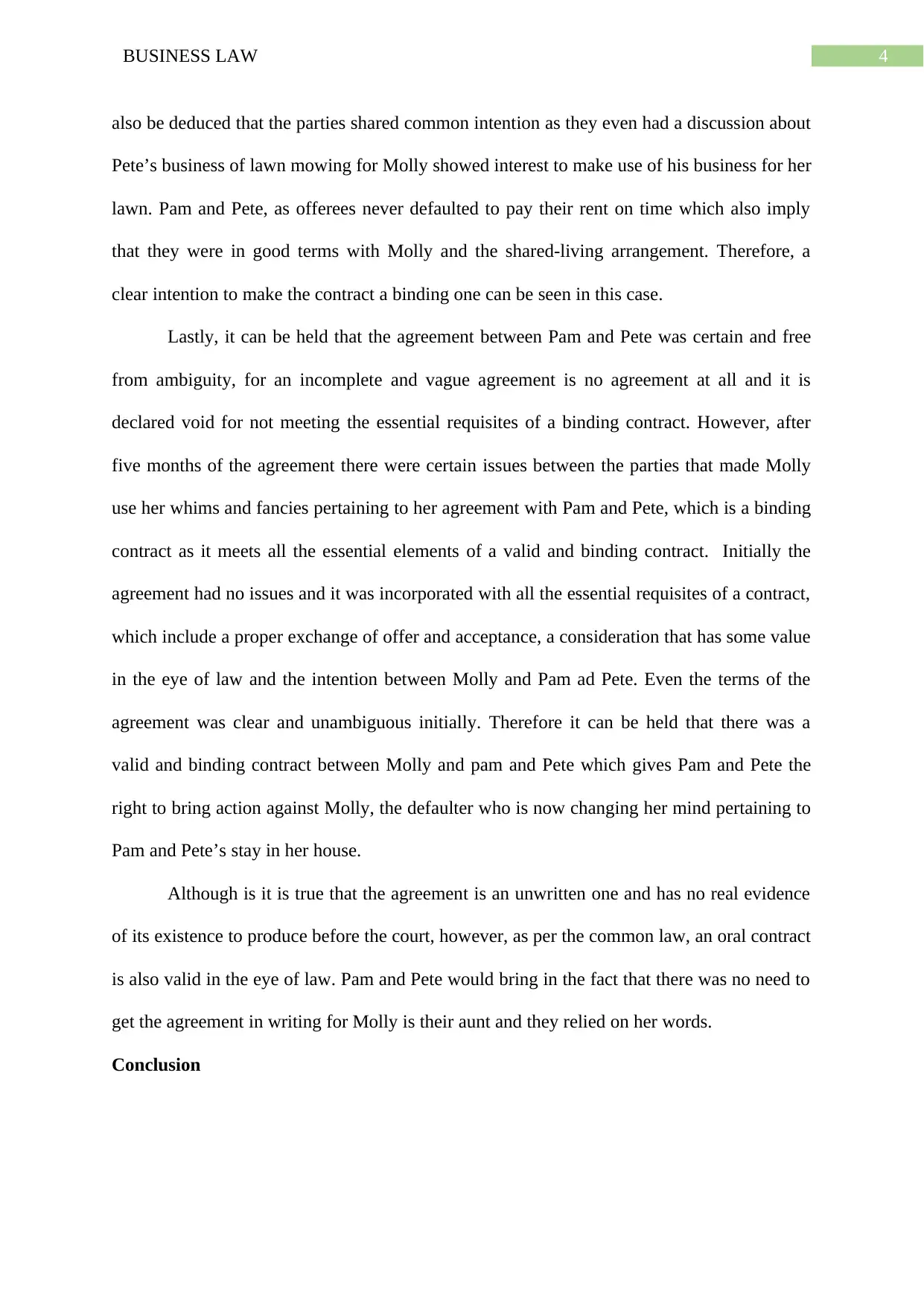
4BUSINESS LAW
also be deduced that the parties shared common intention as they even had a discussion about
Pete’s business of lawn mowing for Molly showed interest to make use of his business for her
lawn. Pam and Pete, as offerees never defaulted to pay their rent on time which also imply
that they were in good terms with Molly and the shared-living arrangement. Therefore, a
clear intention to make the contract a binding one can be seen in this case.
Lastly, it can be held that the agreement between Pam and Pete was certain and free
from ambiguity, for an incomplete and vague agreement is no agreement at all and it is
declared void for not meeting the essential requisites of a binding contract. However, after
five months of the agreement there were certain issues between the parties that made Molly
use her whims and fancies pertaining to her agreement with Pam and Pete, which is a binding
contract as it meets all the essential elements of a valid and binding contract. Initially the
agreement had no issues and it was incorporated with all the essential requisites of a contract,
which include a proper exchange of offer and acceptance, a consideration that has some value
in the eye of law and the intention between Molly and Pam ad Pete. Even the terms of the
agreement was clear and unambiguous initially. Therefore it can be held that there was a
valid and binding contract between Molly and pam and Pete which gives Pam and Pete the
right to bring action against Molly, the defaulter who is now changing her mind pertaining to
Pam and Pete’s stay in her house.
Although is it is true that the agreement is an unwritten one and has no real evidence
of its existence to produce before the court, however, as per the common law, an oral contract
is also valid in the eye of law. Pam and Pete would bring in the fact that there was no need to
get the agreement in writing for Molly is their aunt and they relied on her words.
Conclusion
also be deduced that the parties shared common intention as they even had a discussion about
Pete’s business of lawn mowing for Molly showed interest to make use of his business for her
lawn. Pam and Pete, as offerees never defaulted to pay their rent on time which also imply
that they were in good terms with Molly and the shared-living arrangement. Therefore, a
clear intention to make the contract a binding one can be seen in this case.
Lastly, it can be held that the agreement between Pam and Pete was certain and free
from ambiguity, for an incomplete and vague agreement is no agreement at all and it is
declared void for not meeting the essential requisites of a binding contract. However, after
five months of the agreement there were certain issues between the parties that made Molly
use her whims and fancies pertaining to her agreement with Pam and Pete, which is a binding
contract as it meets all the essential elements of a valid and binding contract. Initially the
agreement had no issues and it was incorporated with all the essential requisites of a contract,
which include a proper exchange of offer and acceptance, a consideration that has some value
in the eye of law and the intention between Molly and Pam ad Pete. Even the terms of the
agreement was clear and unambiguous initially. Therefore it can be held that there was a
valid and binding contract between Molly and pam and Pete which gives Pam and Pete the
right to bring action against Molly, the defaulter who is now changing her mind pertaining to
Pam and Pete’s stay in her house.
Although is it is true that the agreement is an unwritten one and has no real evidence
of its existence to produce before the court, however, as per the common law, an oral contract
is also valid in the eye of law. Pam and Pete would bring in the fact that there was no need to
get the agreement in writing for Molly is their aunt and they relied on her words.
Conclusion

5BUSINESS LAW
Therefore to conclude, it could be deduced that the presence of all the essential
element of a valid contract makes the agreement of Pam and Pete with their aunt Molly
binding in the eye of law, giving them the opportunity to sue Molly for evicting them.
Therefore to conclude, it could be deduced that the presence of all the essential
element of a valid contract makes the agreement of Pam and Pete with their aunt Molly
binding in the eye of law, giving them the opportunity to sue Molly for evicting them.
⊘ This is a preview!⊘
Do you want full access?
Subscribe today to unlock all pages.

Trusted by 1+ million students worldwide
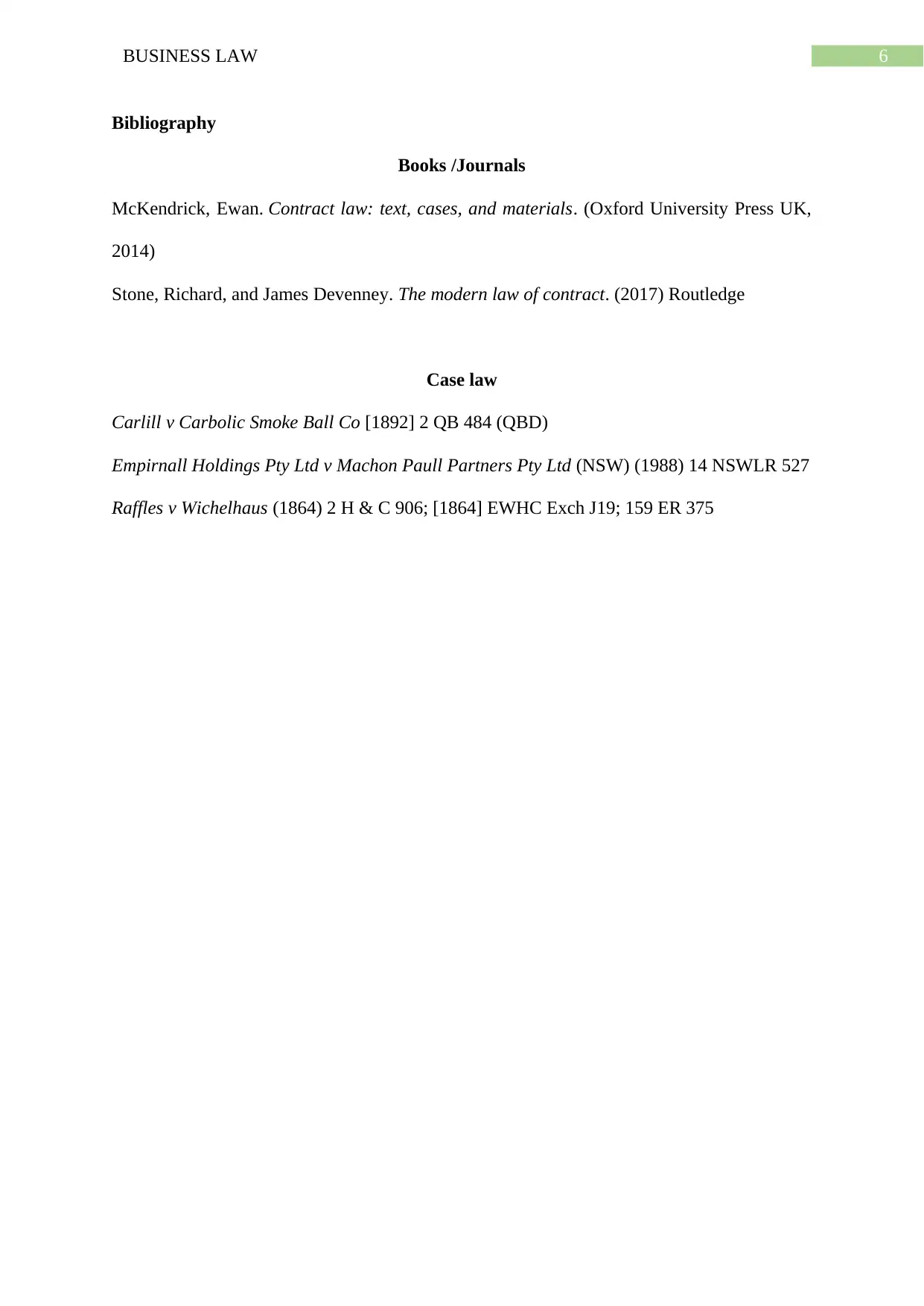
6BUSINESS LAW
Bibliography
Books /Journals
McKendrick, Ewan. Contract law: text, cases, and materials. (Oxford University Press UK,
2014)
Stone, Richard, and James Devenney. The modern law of contract. (2017) Routledge
Case law
Carlill v Carbolic Smoke Ball Co [1892] 2 QB 484 (QBD)
Empirnall Holdings Pty Ltd v Machon Paull Partners Pty Ltd (NSW) (1988) 14 NSWLR 527
Raffles v Wichelhaus (1864) 2 H & C 906; [1864] EWHC Exch J19; 159 ER 375
Bibliography
Books /Journals
McKendrick, Ewan. Contract law: text, cases, and materials. (Oxford University Press UK,
2014)
Stone, Richard, and James Devenney. The modern law of contract. (2017) Routledge
Case law
Carlill v Carbolic Smoke Ball Co [1892] 2 QB 484 (QBD)
Empirnall Holdings Pty Ltd v Machon Paull Partners Pty Ltd (NSW) (1988) 14 NSWLR 527
Raffles v Wichelhaus (1864) 2 H & C 906; [1864] EWHC Exch J19; 159 ER 375
1 out of 7
Related Documents
Your All-in-One AI-Powered Toolkit for Academic Success.
+13062052269
info@desklib.com
Available 24*7 on WhatsApp / Email
![[object Object]](/_next/static/media/star-bottom.7253800d.svg)
Unlock your academic potential
Copyright © 2020–2026 A2Z Services. All Rights Reserved. Developed and managed by ZUCOL.




